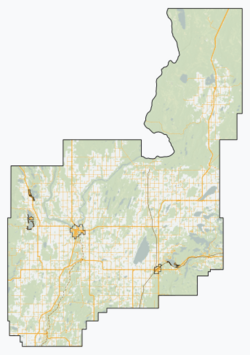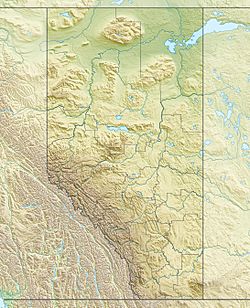White Gull, Alberta facts for kids
Quick facts for kids
White Gull
|
|
|---|---|
|
Former summer village
|
|
| Country | Canada |
| Province | Alberta |
| Region | Northern Alberta |
| Census division | 13 |
| Municipal district | Athabasca County |
| Incorporated (summer village) | January 1, 1983 |
| Dissolved | January 1, 2003 |
| Area | |
| • Land | 4.03 km2 (1.56 sq mi) |
| Population
(2006)
|
|
| • Total | 124 |
| Time zone | UTC-7 (MST) |
| • Summer (DST) | UTC-6 (MDT) |
White Gull is a small, former community located in northern Alberta, Canada. It is part of Athabasca County. This area is about 138 kilometers (86 miles) north of Edmonton, a major city in Alberta. White Gull is situated just one kilometer west of Highway 2. Today, it is known as an unincorporated community, meaning it does not have its own local government.
A Look Back: The History of White Gull
White Gull officially became a "summer village" on January 1, 1983. A summer village is a special type of community in Alberta. It is often a place where people have vacation homes. These villages usually have a smaller population than regular towns. They are designed to serve people who visit during the warmer months.
However, White Gull's status as a summer village did not last forever. On January 1, 2003, White Gull stopped being a village. It was "dissolved" from its village status. This means it no longer had its own local government as a village. Instead, it became part of Athabasca County.
Population of White Gull
Understanding the population of a place helps us learn about its growth. This information is called "demographics." Statistics Canada is the national agency that collects this data. They conduct a census every few years to count everyone in Canada.
Here is how White Gull's population changed over the years:
|
||||||||||||||||||||||||
In the 2006 Census, White Gull had a population of 124 people. These people lived in 54 of the 143 available homes. This was a big jump from its population of 36 people in the 2001 Census.
White Gull covers a land area of 4.03 square kilometers (1.56 square miles). In 2006, this meant there were about 30.8 people living in each square kilometer. This number shows how many people live in a certain amount of space.
 | Emma Amos |
 | Edward Mitchell Bannister |
 | Larry D. Alexander |
 | Ernie Barnes |



